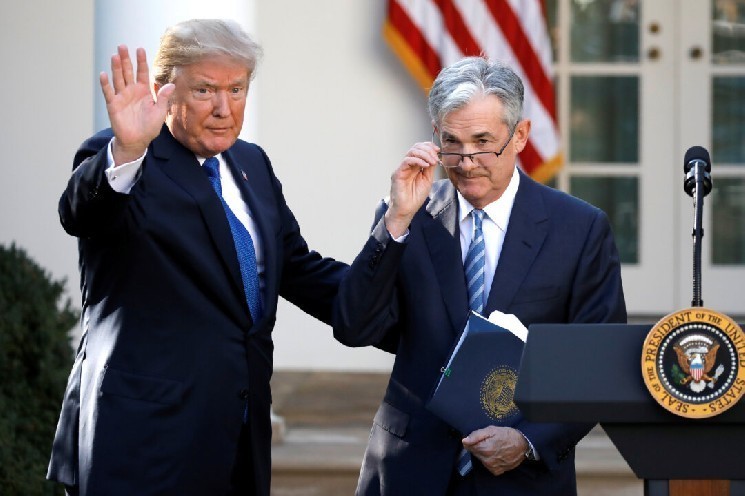Trump Escalates Feud with Federal Reserve Chair Amid Economic Uncertainty
President’s Remarks Signal Potential Shake-up at Central Bank as Post-Shutdown Economic Data Trickles In
In an extraordinary escalation of tensions between the White House and America’s central bank, President Donald Trump has launched his most direct attack yet on Federal Reserve Chairman Jerome Powell, igniting fresh concerns about the independence of the institution that steers the nation’s monetary policy. During a candid late-night statement that sent shock waves through financial markets, Trump explicitly referenced efforts to constrain his ability to remove Powell from his position, suggesting that such a move remains firmly on his agenda despite legal questions surrounding a president’s authority to dismiss a Fed chair.
“People are trying to stop me from firing Powell,” the President declared without elaboration on who these unnamed obstacles might be, creating immediate uncertainty in economic circles already navigating the aftermath of the recent government shutdown. Trump’s unprecedented public targeting of the Fed chair marks a significant departure from the traditional arm’s-length relationship maintained between the White House and the Federal Reserve, an institution designed to operate independently from political pressure. Financial analysts note that even the perception of political interference in monetary policy decisions could undermine market confidence at a delicate economic moment.
The President’s comments extended beyond mere frustration, venturing into territory that suggests concrete plans may already be in motion. “I hope Powell resigns now. I pretty much know who the new Fed Chair will be,” Trump stated, hinting that both “expected and unexpected candidates” are under consideration for the crucial position. This revelation implies that the administration may have moved beyond merely expressing dissatisfaction with Powell’s leadership to actively preparing for his potential replacement. The timing of these remarks is particularly significant as they come just weeks before the Federal Open Market Committee’s next meeting, where officials are scheduled to revisit discussions about potential interest rate adjustments in response to evolving economic conditions.
Economic Data Vacuum Complicates Federal Reserve’s Decision-making Process
The background to this high-stakes confrontation is further complicated by the recent government shutdown, which created a substantial gap in economic data collection and reporting. With federal agencies now reopening, delayed economic indicators will finally begin reaching Fed officials this week, though the information vacuum created by the shutdown presents significant challenges for monetary policymakers attempting to gauge the true state of the economy. The Bureau of Labor Statistics has announced that the September employment report—a critical indicator of economic health—will be released Thursday, providing the first major post-shutdown economic snapshot.
However, the data disruption extends beyond mere delays. According to White House officials, some October economic reports may be skipped entirely due to collection challenges during the shutdown period. More concerning for long-term economic analysis, November data gathering efforts may also be hampered by the residual effects of the government closure, potentially creating lasting gaps in economic trend analysis. This compromised data environment creates an especially challenging backdrop for the Federal Reserve’s upcoming meeting, where officials must make consequential decisions about interest rate policy without the benefit of complete and timely economic information.
The timing of Trump’s comments appears strategically significant, coming just as the Federal Reserve enters a critical three-week countdown to its next policy meeting. Powell, who was actually nominated by Trump himself before their relationship deteriorated over interest rate policy disagreements, has consistently maintained that the Fed’s decisions are data-driven and independent of political considerations. Market watchers note that the President’s persistent criticism of Powell has centered primarily around the pace of interest rate increases under his leadership, which Trump has repeatedly characterized as too aggressive and harmful to economic growth.
Legal and Market Implications of Presidential Interference in Fed Independence
The constitutional and legal questions surrounding a president’s authority to remove a Federal Reserve chair remain complex and largely untested. While the President nominates the Fed chair (subject to Senate confirmation), the position’s term is deliberately set at four years to span presidential election cycles and insulate monetary policy from political pressures. Financial and legal experts generally agree that while a president can decline to renominate a chair when their term expires, the ability to outright fire a sitting Fed chair is severely constrained by law, requiring evidence of cause beyond policy disagreements.
Wall Street veterans and economists across the political spectrum have expressed alarm at the President’s explicit targeting of Powell, warning that undermining Federal Reserve independence could have profound and lasting negative consequences for market stability and economic confidence. Former Fed officials from both Republican and Democratic administrations have emphasized that central bank independence represents a cornerstone of modern economic governance, with research consistently showing that countries with politically independent central banks generally experience lower inflation and more stable economic conditions over time.
The unfolding drama between the White House and the Federal Reserve takes place against a backdrop of mixed economic signals. While unemployment remains historically low and consumer spending has shown resilience, manufacturing data has softened in recent months, and global trade tensions continue to create headwinds for certain sectors. International investors are watching closely, as any perception that the world’s most powerful central bank might become susceptible to direct political influence could trigger significant market volatility and potentially alter global investment flows.
As Washington processes the implications of the President’s latest comments, the focus now shifts to how Powell and the Federal Reserve will navigate this unprecedented pressure while fulfilling their dual mandate of maintaining price stability and maximizing employment. With critical economic data finally becoming available and major monetary policy decisions looming, the independence of America’s central bank faces perhaps its most significant test in modern times.
This article represents analysis of current events and is not intended as investment advice.


